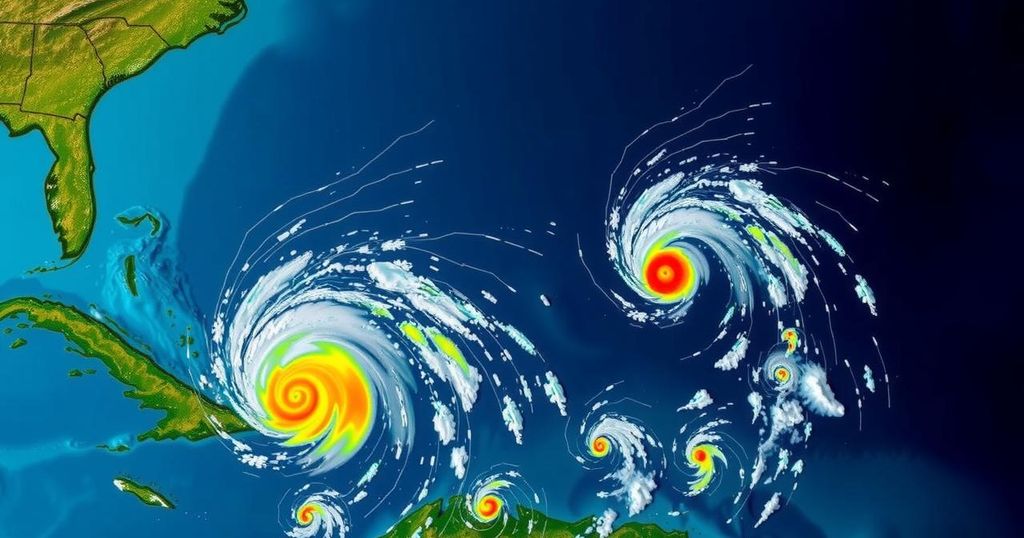2024 Atlantic Hurricane Season Review: Record Activity and Climate Impact

The 2024 Atlantic hurricane season concludes with 18 named storms, including 11 hurricanes and five major hurricanes. Despite an active start highlighted by Hurricane Beryl’s record, the mid-season was quiet, raising questions given warm sea temperatures. A resurgence occurred with Hurricane Helene, leading to severe impacts and fatalities in the southeastern United States, illustrating the escalating dangers associated with climate change, which intensified storm characteristics during the season.
The 2024 Atlantic hurricane season is concluding, marking an overall active period characterized by 18 named tropical storms, 11 of which escalated to hurricane status and five reached category three or higher. While the average season typically witnesses 14 storms, seven hurricanes, and three major hurricanes, this year saw fluctuations in activity distribution. Intriguingly, a record was achieved with Hurricane Beryl becoming the earliest category five hurricane on July 2, only to be followed by an unexpected quiet period despite favorable conditions for storm development.
As the season progressed, conditions shifted notably. Following Beryl’s early activity, the season entered a lull from July to late September, producing merely four named storms and no major hurricanes during this time. This unexpected drop in activity came despite unusually warm ocean temperatures, which generally support hurricane formation. A significant influence was attributed to altered weather patterns in Africa, which affected the location of tropical systems’ development. Subsequently, Hurricane Helene emerged in late September, escalating to a category four storm and causing widespread destruction across the southeastern United States.
Helene claimed over 150 lives, marking it as one of the deadliest hurricanes since Hurricane Katrina in 2005. This resurgence continued with a rapid succession of storms, including Hurricane Milton, which experienced aggressive intensification, triggering wind speeds to escalate by 90 mph in just one day. As the season drew to a close, Tropical Storm Sara resulted in substantial flooding in Central America.
The 2024 season’s experiences underline a critical connection to climate change, given that sea surface temperatures have risen approximately 1°C above historical averages. Analysis reveals that climate change played a role in increasing wind speeds across all hurricanes this season, with Hurricane Milton’s intensity heightened by 23 mph due to global warming influences. Moreover, rainfall from Milton was exacerbated by climate change, intensifying the risks associated with such storms. This indicates a concerning trend where, although the frequency of storms may not increase, the intensity and consequent hazards are expected to intensify significantly.
The Atlantic hurricane season occurs annually from June 1 to November 30, with expectations for peak activity typically reaching early September. This season has seen varied storm activity, which deviated from pre-season forecast predictions of an above-average number of storms, particularly in light of rising sea temperatures attributed to climate change. Understanding the factors influencing hurricane behavior, such as warm ocean conditions and climatic shifts, is essential in assessing their impact and anticipating future trends. Climate change has been identified as a significant contributor to enhancing the conditions necessary for hurricanes to form, highlighting the urgency for further study and mitigation efforts.
In conclusion, the 2024 Atlantic hurricane season presented unexpected fluctuations in activity, culminating in significant storms that tested regional preparedness and response systems. The increased intensity and catastrophic outcomes of hurricanes this year illustrate the profound implications of climate change on storm behavior and the necessity for continued research. As the climate continues to evolve, the characteristics of future hurricane seasons may pose substantial challenges, emphasizing the need for adaptive strategies and enhanced disaster preparedness.
Original Source: www.bbc.com






